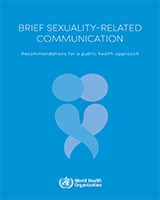PICO refers to four elements that should be in a question governing a systematic search of the evidence: population, intervention, comparator and outcomes. The following three PICO questions were identified by the Guideline Development Group as the basis for the systematic review. Each question includes outcomes that were identified and scores rated for each.
PICO 1: Is brief sexuality-related counselling (BSC) as applied to adolescents and adults more effective than the usual standard of care in preventing/addressing:
- 1.1.
sexual difficulties, sexual disease, sexual distress, sexual concerns and sexual misconceptions
- 1.2.
STIs and HIV
- 1.3.
unintended pregnancy and abortion
- 1.4.
sexual violence
- 1.5.
harmful practices
- 1.6.
knowledge increase
View in own window
| OUTCOME | RATING (1–9) |
|---|
| HIV =/> 6–12 months follow-up | 8.5 |
| Sexual difficulties, disease, distress, concerns, misconceptions, stigma | 8.4 |
| Sexually transmitted infections (STIs) =/> 6–12 months follow-up | 8.4 |
| Unintended pregnancy/abortion =/> 6–12 months follow-up | 8.3 |
| Sexual violence =/> 6–12 months follow-up | 7.8 |
| Relationship difficulties, relationship abuse, relationship dissatisfaction | 7.7 |
| Knowledge =/> 6–12 months follow-up | 6.9 |
| Harmful practices (e.g. female genital mutilation) | 5.9 |
PICO 2: Is BSC as applied to adolescents and adults more effective and encouraging of sexual well-being than no intervention?
View in own window
| OUTCOME | RATING (1–9) |
|---|
| Increased safety (condom use, contraceptive use, reduced number of sexual partners) | 8.2 |
| Use of preventative services (STI testing, HIV testing, contraceptive demand, vaccinations) | 8.2 |
| Increased satisfaction | 8.1 |
| Better self-regulation | 7.7 |
| Feeling understood or accepted | 7.6 |
| Increased connectedness (feeling of being accepted by those around i.e. family, school, peers) | 7.6 |
| Increased autonomy | 7.6 |
| Higher self-esteem | 7.4 |
PICO 3: Which elements of (sensitization/training) programmes for primary health-care providers increase knowledge and skills on sexuality counselling/communication? (sensitive issues to consider include: abortion, gender-based violence, sexual dysfunction, sexual health, erectile dysfunction, pleasure, fantasies, sexual orientation, gender identity, same sex desire, sexual desire, female genital mutilation).
View in own window
| OUTCOME | RATING (1–9) |
|---|
| Knowledge | 7.8 |
| Objective-measured | 7.5 |
| Self-reported | 7.4 |
| Comfort in addressing sexuality-related issues, promotion of sexual pleasure | 8.6 |
| Attitude towards sexual health risk assessment | 8.4 |
| Improved patient interaction skills (asking about sexual risk-taking, providing confidentiality, addressing barriers/sensitive issues) | 8.6 |
| Objective-measured | 8.4 |
| Self-reported | 7.5 |
| Use of education techniques (use of written materials for the patient, referral to relevant online resources, ensuring patient understands issue, etc.) | 7.6 |
| Frequency of STI diagnosis (self-reported) | 7.3 |

